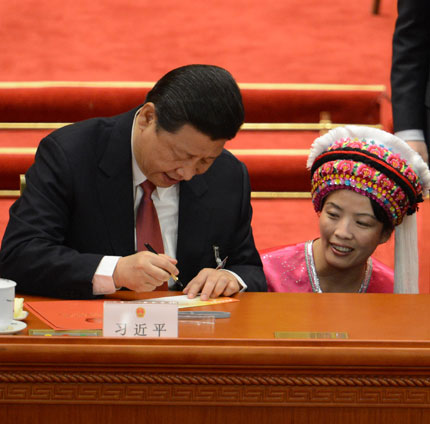Xi Jinping takes a bow as China's president
 0 Comment(s)
0 Comment(s) Print
Print E-mail Xinhua, March 15, 2013
E-mail Xinhua, March 15, 2013
Xi Jinping, general secretary of the Communist Party of China Central Committee, was elected China's president and chairman of the Central Military Commission yesterday.
 |
|
A lawmaker asks newly elected Chinese President Xi Jinping for their autographs after yesterday's elections during the 12th National People's Congress in the Great Hall of the People in Beijing. |
When Liu Yunshan, executive chairman of the presidium for the first session of the 12th National People's Congress, announced the election results, Xi stood and bowed to nearly 3,000 NPC deputies in Beijing's Great Hall of the People.
Amid thunderous applause, he shook hands with Hu Jintao, who had served as head of state since 2003.
Born in 1953 into a revolutionary family from Fuping in northwest China's Shaanxi Province, Xi joined the Party in January 1974.
He graduated from the School of Humanities and Social Sciences at Tsinghua University with a major in Marxist theory and ideological and political education.
From the Loess Plateau to the southeast coast and then to Beijing, and from a county-level official to the central leadership, Xi has had a well-rounded political career.
On November 15, 2012, he was elected general secretary of the Party's Central Committee at the first plenum of the 18th CPC Central Committee and became the first top Party leader born after October 1949, when the People's Republic of China was founded.
Xi's performance as Party leader in the past four months has been impressive, said Cai Jiming, an NPC deputy.
"I am inspired by Xi's elaboration on the 'Chinese dream,'" he said. "He has advocated a new working style and shown resolve in pushing forward reform and fighting corruption, which is refreshing to me."
Li Yuanchao, 62, was elected vice president.
From 2007 to 2012, Li headed the CPC Central Committee's organization department.
The plenary meeting also saw the elections of leaders and members of the 12th NPC Standing Committee, the permanent organ of the country's parliament.
Zhang Dejiang, a 66-year-old member of the Standing Committee of the Political Bureau of the CPC Central Committee, was elected chairman. He replaced Wu Bangguo, who held the position for the past decade.
Zhang, who graduated from the Department of Economics at Kim Il Sung University in North Korea, has been vice premier since 2008. Before that, he led Zhejiang and Guangdong, two of the country's most developed provinces.
Li Jianguo, Wang Shengjun, Chen Changzhi, Yan Junqi, Wang Chen, Shen Yueyue, Ji Bingxuan, Zhang Ping, Qiangba Puncog, Arken Imirbaki, Wan Exiang, Zhang Baowen and Chen Zhu were elected vice chairpersons of the NPC Standing Committee.
Wang Chen was also elected secretary-general of the NPC Standing Committee.
A total of 2,963 deputies took part in a secret ballot supervised by 35 monitors.
The elections of president and vice president of China, chairman of the CMC, and chairman, vice chairpersons and secretary-general of the 12th NPC Standing Committee are non-competitive.
A total of 161 committee members were elected from a pool of 174 candidates.
NPC deputies also adopted a Cabinet restructuring plan aimed at reducing bureaucracy.






Go to Forum >>0 Comment(s)